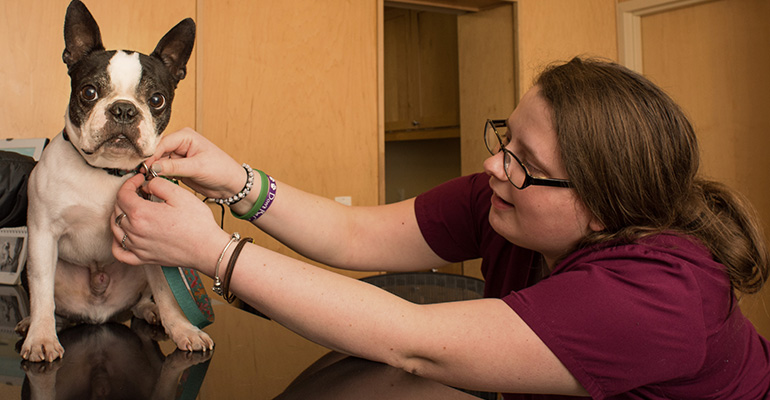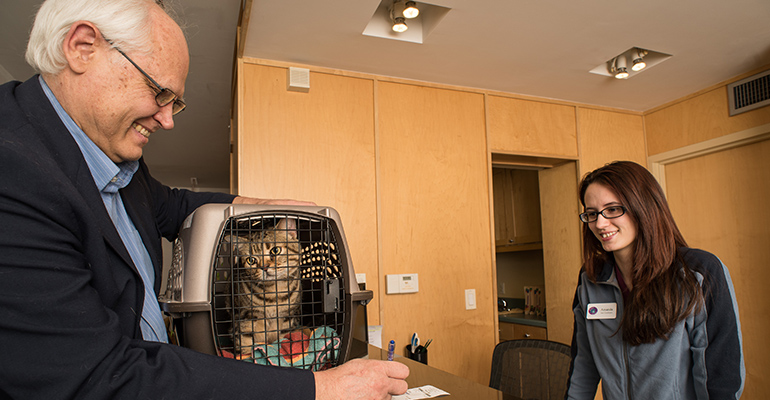When you welcome a new pet into your heart and home, the first veterinary exam is very important to ensure the health and well being of your new furry friend. It also ensures the safety of any current pets and family members. We will ask you to drop off or ask permission to request any previous medical records. Our team can then familiarize themselves with the vital information about what type of medical care, vaccinations and testing your pet has already had. This helps us form a tentative plan to discuss with you at the time of your appointment and also helps to maximize the time you and your pet spend with Dr. Katz.
You will be asked many questions about your pet by the technician. These questions will give the doctor clues about how your pet is doing overall. Next, Dr. Katz will thoroughly examine your pet from nose to tail, look into their eyes and ears and listen to their heart and lungs. If your pet is due for vaccinations, he or she will receive the appropriate vaccine (and they usually get bribed with some cheese so they won’t even notice!).
You will be asked to bring a fecal sample for your new pet so it can be tested for parasites such as roundworms, hookworms, whipworms, coccidia and giardia. These parasites are common in our furry friends. This fecal test is repeated annually to be certain your pet has not contracted any of these intestinal parasites, since they can be transmitted to your other pets or even human family members.
First Puppy or Kitten Visit
You will be given a schedule for vaccination boosters. We examine puppies and kittens every 3-4 weeks until they are 16 weeks old. This allows us to ensure that we can assess for congenital and growth related issues should they arise and allows us to help with training and behavioral recommendations. These visits also allow us to meet the vaccination needs of a growing puppy or kitten so that we can assure protection. Usually spaying and neutering are scheduled around 6 months of age and kittens should be tested for feline leukemia (FeLV) and feline immunodeficiency virus (FIV) at that time. A pre-anesthetic profile will be taken for every pet prior to surgery to ensure that their organs are functioning properly and can handle the anesthetic drugs used for surgery. This is also a great time to get a microchip implanted. A microchip is a very small device implanted underneath the skin to help identify a patient, which is extremely beneficial in the event of a pet becoming lost. A collar with identification is a great safety measure but collars can be lost or tags can become faded and unreadable. A microchip that is updated with your most current contact information will help to expedite a joyful reunion with your pet.
At this visit, we will provide and review a puppy or kitten pack that helps you learn about many things including nutrition, training, insurance, dental care and more. Our technician will be happy to show you how to trim nails and clean ears. Please feel free to ask any questions you may have about care for your puppy or kitten. You will also be given your first free dose of Sentinel, an oral heartworm preventative for dogs and/or Revolution, a topical flea preventative for puppies and kittens.
Caring for Your Adult Pet
We are always honored to be chosen to care for adult pets. At the time of your pet’s first visit, we will review their previous medical history. This will help us determine how to best continue with your pet’s care. After receiving your medical records, the team at Katz and Dogs Animal Hospital will notify you at the time of the appointment if your pet needs any vaccinations or testing. Dogs are commonly tested for intestinal parasites yearly. A heartworm antigen test is also performed yearly, or every other year if you are consistent with your heartworm prevention year round. Your adult cat should be tested for FeLV and FIV, if they have had exposure outdoors, or have possibly been injured by an animal.
If your dog or cat has been vaccinated for rabies before, your pet will receive a 3 year rabies vaccine. If your pet has already been vaccinated for distemper, we recommend a titer to see if adequate levels of immunity remain from the last vaccine. Evaluating this blood test ensures that pets will not be over vaccinated, but will remain protected. This will be discussed with you at your visit. Other vaccinations offered are based on your individual family lifestyle, such as bordetella (the kennel cough vaccine), influenza (required by some boarding facilities), lyme (for tick exposure) and feline leukemia virus if your cat goes outdoors. If your pet is over 7 years old, routine blood work is recommended yearly to monitor organ function. This can alert the doctor to early stage problems. It is also helpful to have a healthy baseline for future comparison in the event your pet becomes ill.
Please feel free to ask any questions you may have about your pet’s care. The team at Katz and Dogs Animal Hospital is excited at the prospect of you and your pet joining our family and we are always happy to explain every process or recommendation to you. Our goal is for you to feel comfortable and well informed about every aspect of your pet’s care.



